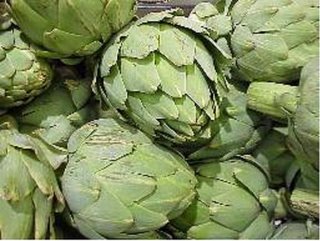Friday Food Pharmacy: Artichokes
 If you have high cholesterol, digestive problems, or liver disease (or even if you don't!), artichokes should be included in your diet…they love your liver and work hard to keep it healthy so it can filter toxins out of your body, regulate your blood glucose levels, and keep iron as well as vitamins A, D, E, and K ready for your use. Artichokes contain neither fat nor cholesterol, are low calorie and low sodium, high in fiber, and contain sixteen nutrients. They will be at their freshest when in season from March through May.
If you have high cholesterol, digestive problems, or liver disease (or even if you don't!), artichokes should be included in your diet…they love your liver and work hard to keep it healthy so it can filter toxins out of your body, regulate your blood glucose levels, and keep iron as well as vitamins A, D, E, and K ready for your use. Artichokes contain neither fat nor cholesterol, are low calorie and low sodium, high in fiber, and contain sixteen nutrients. They will be at their freshest when in season from March through May.
Be careful that you get the real deal, though.
Ancient people considered artichokes to be an aphrodisiac, a diuretic, and even a deodorant for breath and body! Later, artichokes were used in medicine to cleanse the blood, improve bile production, and detoxify the skin and liver. It turns out that, following careful examination and study, artichokes may live up to several of their ancient promises.
The artichoke contains two especially beneficial compounds: cynarin and silymarin. Current research shows that silymarin is a powerful antioxidant, and that both of these compounds help to both protect liver cells and enable the liver to regenerate healthy tissue.
In
An added benefit is that when your digestive system is healthy, it is better able to extract necessary nutrients. When receiving proper nutrition, your whole body works more easily and naturally to transport, and utilize the nutrients you receive through foods. (See the post below this entry on "How holistic healing modalities work & why they're better for you" describing the benefits of reactive medicine and how improving one facet of your health spreads the benefits to others as well.)
Artichoke extract has also been used to reduce cholesterol. "While scientists are not certain how artichoke leaves lower cholesterol, test tube studies have suggested that the action may be due to an inhibition of cholesterol synthesis and/or the increased elimination of cholesterol because of the plant’s choleretic action.(9) In test tube studies, the flavonoids from the artichoke (e.g., luteolin) have been shown to prevent LDL-cholesterol oxidation—an effect that may reduce risk of atherosclerosis.(10)" Source: http://www.vitacost.com/science/hn/Herb/Artichoke.htm
"Are there any side effects or interactions?
At the recommended amount and according to the German Commission E Monograph,(13) there are no known side effects or drug interactions. The use of artichoke is not recommended for those who are allergic to artichokes and other members of the Compositae (e.g., daisy) family. In addition, those who have any obstruction of the bile duct (e.g., as a result of gallstones) should not employ this plant therapeutically. The plant’s [i.e. the extract's] safety during pregnancy and breastfeeding has not been established. At the time of writing, there were no well-known drug interactions with artichoke [extract]." Source: http://www.vitacost.com/science/hn/Herb/Artichoke.htm

We all love artichokes in antipasto salads, but there are many other delicious ways to include them in your menus! Here are a few recipe sites with great ideas and suggestions.
What's cooking
Check out their Fettuccine with Baby Artichokes (I frequent a restaurant that serves a dish similar to this which includes shrimp…. Yum!!)
The Gutsy Gourmet offers some recipes and other interesting artichoke facts.
Here's a page of artichoke dip recipes from CD Kitchen
If you are one of the folks who has heard that the word artichoke has some tie to choking, you'll enjoy this:
From the American Heritage Dictionary: Word History: Those who have been warned to watch out for the sharp-tipped bracts toward the innermost part of an artichoke may have wondered whether the name of this vegetable has anything to do with choking. Originally it did not. Our word goes back to an Arabic word for the same plant, al-harsuf. Along with many other Arabic words, it passed into Spanish during the Middle Ages, when Muslims ruled much of
Eat Healthy, Be Happy!
No comments:
Post a Comment